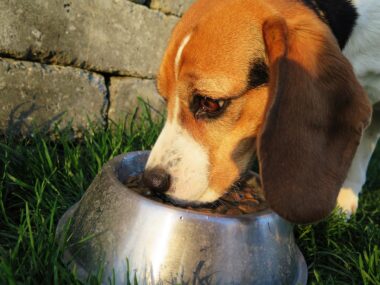The Importance of Balanced Meals for Dogs
Understanding the importance of balanced meals for dogs can greatly improve their overall health and happiness. A dog’s diet should include a combination of proteins, carbohydrates, fats, vitamins, and minerals to provide them with the essential nutrients they need. Proper nutrition supports their growth, energy levels, and strong immune systems while decreasing the risk of obesity and chronic diseases. When considering dog food, it’s crucial to select high-quality ingredients that promote a long and healthy life. Additionally, dog owners should be aware of their pet’s specific needs based on age, breed, and health conditions. Formulating a balanced meal requires knowledge about serving sizes and nutrient content to ensure optimal health. It is essential to consult with a veterinarian when exploring dietary changes to ensure they meet all nutritional needs effectively. A good diet regime combined with regular veterinary check-ups can lead to a significant reduction in health issues over time. As a responsible owner, focusing on canine nutrition is vital to maintain a vibrant life for your dog, allowing them to enjoy every moment with you.
Dogs, like humans, require different nutrients that vary depending on their specific lifestyle and needs. A balanced diet can help them maintain a healthy weight, build strong bones, and reduce the risk of various diseases. Here are some essential elements of a balanced canine diet:
- Proteins: Essential for muscle development and repair, sourced from meats, eggs, and plant-based proteins.
- Carbohydrates: Provide necessary energy, found in grains, vegetables, and fruits.
- Fats: Essential for skin health and energy, derived from oils and fatty fish.
- Vitamins and Minerals: Crucial for metabolic processes and maintaining overall health, usually sourced from fresh fruits and vegetables.
With the right mix of these nutrients, owners can help support their dogs’ overall well-being. Regularly adjusting your dog’s diet according to their age and lifestyle changes is also part of maintaining their nutritional balance. Ensuring your dog enjoys every bite is paramount for their happiness and health.
Another aspect to focus on is understanding the importance of hydration for your dog. Just like nutrition, water is an essential component of your dog’s diet. Proper hydration supports vital bodily functions, including digestion, circulation, and temperature regulation. An average dog should drink about one ounce of water per pound of body weight daily, ensuring they stay hydrated throughout the day. Always make sure your furry friend has access to fresh, clean water, especially following physical activity. If your dog consumes dry kibble, this increases their water requirement due to lower moisture content in food. Observe your pet’s behavior; if they seem lethargic or their skin doesn’t spring back when pinched, dehydration may be an issue. Adding wet food to their diet can help improve hydration levels. Consulting with your veterinarian can also provide tailored advice on how best to ensure hydration. In addition, consider the time of year, as hotter temperatures mean dogs need even more water. Proper hydration is an integral part of your dog’s overall meal plan and well-being.
Choosing the Right Dog Food
Choosing quality dog food is crucial in ensuring your pet receives the necessary nutrition for a balanced diet. Not all commercial dog foods are created equal, and some can contain fillers and low-quality ingredients that may not benefit your dog. When selecting food, always read labels carefully. Look for products that list quality meat sources as the first ingredient, along with whole grains and vegetables, rather than byproducts and fillers. Additionally, consider your dog’s specific needs; some breeds require specialized diets due to their genetic predispositions or health concerns. Puppies, adult dogs, and seniors each require different nutrient profiles, so choose accordingly. Premium brands often have higher-quality ingredients, but always verify their reputation and read reviews before purchasing. Remember that transitioning to a new food should be gradual to avoid gastrointestinal upset. Mixing the new food with the old gradual can help make the switch easier on your pup. Investing the time and effort into understanding dog food options is well worth it for ensuring your furry companion’s happiness and long-term health.
Allergies can complicate your dog’s dietary needs. Many dogs may experience allergic reactions to certain ingredients, which makes it essential for owners to recognize potential symptoms. Common allergens include chicken, beef, soy, and wheat. If you suspect your dog has a food allergy, it’s crucial to consult a veterinarian for the appropriate testing. They may recommend an elimination diet to help pinpoint the offending ingredient. A balanced meal plan can still be developed, even with allergies, by selecting hypoallergenic or limited-ingredient diets adjusted to your dog’s specific needs. Moreover, it’s vital to assess if these factors lead to skin irritations, digestive upset, or behavioral issues. Owners can monitor their dog’s reactions to new foods closely, maintaining a food journal that tracks meals and symptoms. This proactive approach enables owners to provide individualized nutrition tailored to their dog’s health. Ensuring your dog receives the right nutrition, even amidst allergies, will significantly improve their quality of life and health over time. Additionally, consider keeping treats at a minimum to avoid possible allergic reactions while you determine triggers.
Incorporating regular exercise alongside a balanced diet is equally important for maintaining your dog’s health. A nutritious diet fuels your dog’s activity levels, while regular physical activity keeps their weight in check and supports cardiovascular health. Aim for daily walks, playtime, and fun activities to ensure your dog remains active and engaged. The right balance of exercise and food is essential for managing weight, especially in breeds prone to obesity. Under or overfeeding is detrimental to their well-being; restoring their balance requires ongoing adjustments to their meals and activities. Keeping a routine can also help promote mental and physical stimulation for your dog; consider increasing the complexity of exercises as your dog develops better skills. Remember that different breeds and individual dogs have varying exercise requirements, so adjust physical activity based on age, breed, and health characteristics. Regular vet check-ups also provide insight into your dog’s overall fitness, ensuring they remain healthy. Encouraging a combination of healthy eating habits and exercise promotion fosters a happy and healthy life for your pet.
Final Thoughts on Dog Nutrition
Ultimately, focusing on balanced nutrition leads to happier and healthier dogs. Pet owners have the responsibility to provide meals that cater to their canine companions’ needs for optimal growth, energy, and overall health. Regular attention to their diet allows for adjustments that ensure every nutrient is adequately addressed, promoting longevity and vitality in your pet’s life. Observing your dog’s appetite, energy, and overall behavior can indicate whether you’re providing suitable nutrition. Furthermore, staying informed about new dietary research can equip you with the knowledge needed to make informed choices when feeding your dog. Engage your veterinarian regularly to discuss dietary adjustments and seek expert opinions on the latest dog nutrition trends. A holistic view of your dog’s well-being includes a focus on proper nutrition, routine check-ups, and activities tailored to their unique requirements. By doing so, you’ll establish an environment in which your dog thrives. Happy feeding time not only fulfills physical needs but also strengthens the bond between owner and dog, fostering a better life experience.





